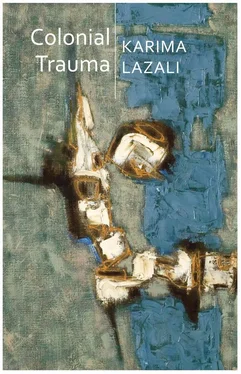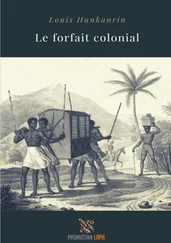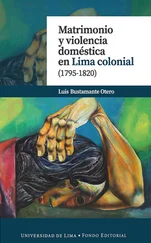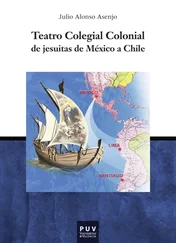The celebration of the figure of the hero or martyr in the War of Liberation offers nothing more than an alibi, a distraction from the intensification of this erasure. This was a matter of refounding Algeria, erasing the colonial past, not “deconstructing” but rather “reconstructing,” Lazali indicates. This reconstruction presupposes the creation of a heroic gesture of liberation, and it presumes that deaths caused by internal wars should not be surveyed. The postcolonial imposition of one language, Arabic, and of one religion, Islam, in Algeria led to the production of a myth: the myth of the birth of a nation that, again, arbitrary and denialist, erases the past and seeks to establish a point of origin or degree zero for history.
Perhaps this blank in the history of a colonizing (republican?) France, which denies the shameful, monarchic remainder that determined its strategy for occupation, corresponds to a historical blank in Algeria, a denial of the shameful history of responsibility for internal wars. This leads to a paradoxical effect on the way to liberation: the historiography of Algeria at first refers almost exclusively back to colonization, and a pure, urgent, extreme, and totalizing nationalism emerges to heal the damage done. As Lazali explains, an excess of memory also emerges in relation to colonialism, an excess that is in the service of erasure, that safeguards the blank in memory itself, like a spotlight that sheds too much light and so dazzles us. Thus a gradual transformation takes place: colonial trauma becomes social trauma.
Lazali writes:
With a political agenda predicated on eradicating all forms of alterity, coloniality has inflamed hatred by seeking to preserve the One by killing the Other. To what extent does the rise of “nationalism” in Algeria coincide with the barring of alterity? And what impact has colonialism’s negation of the paternal function had on contemporary politics? (p. 101)
These turn out to be central questions for the development of her argument. The advent of colonialism destroyed the paternal function, defined as a symbolic function and a function of thirdness that organizes the social bond, genealogy, the delineation of communities of belonging, and the constitution of identity on the basis of the assignment of a name. This function has been systematically and deliberately obstructed in Algeria since the historical break represented by colonialism. Deaths, disappearances, and the changing of names have made it impossible to determine who is who, whose child is whose, whose sibling is whose.
The advent of this disaffiliation led not only to the fragmentation of the social body by France and the War of Liberation. The internal wars that marked Algeria’s history during the War of Liberation and continued after it, reaching their height in the 1990s, compel us to ask what the model for such incessantly repeated killing among brothers might be, and what might account for this ongoing search for and repeated removal of the figure of the father. Lazali critically revisits Freud’s theory, developed in Totem and Taboo (she mentions James Jasper Atkinson’s competing theory as well), and she wonders why the removal of the father and founder of Algerian nationalism, Messali Hadj, and the killing of Ramdane Abane (a leader in the National Liberation Front [ Front de Libération Nationale , or FLN]) in 1957 did not result in the formation of an alliance among brothers, but instead resulted in a bitter and fratricidal internal war that brutally pitted the FLN against Messali Hadj’s followers and FLN combatants against one another, leading to a series of killings and ousters throughout Algeria’s subsequent history.
In Stasis: Civil War as a Political Paradigm (2015), Giorgio Agamben accounts for the development of civil wars by referring to a permanent and unresolvable tension between the oikos (the house, the family) and the polis , in which civil war functions as a threshold between politicized family relations and the polis redefined in familial terms. It would seem that in this case of conflict between “us” and “them,” at this threshold of difference and foreignness, a particular instance of what Agamben calls the irresolvable is at work. This is no longer the irresolvable tension between an “inside” ( oikos ) and an “outside” ( polis ), but rather a tension between a precolonial heterogeneity, excessively open to colonial invasion, and a reactive us whose formation required the suppression of even the most minimal divergence from the aim of constructing an illusory, unbreakable One.
As long as heterogeneity, otherness, and the foreign appear as threats, the social and subjective effects will be incalculable. This is not only because the Other will always be defined as an enemy, will always be regarded with suspicion, but also because, Lazali suggests, otherness instills psychic functioning, and thus the Other within is also experienced as a threat and as an obstacle. Lazali cites Albert Memmi, who argues, in perfect agreement with Fanon, that the task of subjective decolonization, the eradication of both the part of the self that is colonizing and the part that is colonized, is the tragic destiny of the colonized subject. Neither the colonizing nor the colonized part of the self belongs entirely to the self. This is a matter of a doubling at the level of identity that never produces mixing or confluence but instead leads to dissociation.
How, then, Lazali wonders, could we be the inheritors of what preceded our existence and what we cannot speak of, for reasons we do not know? Hogra (an insult, the humiliation that resulted from colonialism and crystallized its effects) is thus necessary as a signifier that gives shape to history. But it also fulfills an aiding and abetting function in that it persists, unaltered and unmodifiable, in the psychic life of future generations. Ultimately, Lazali asks, wasn’t this what colonialism sought to achieve? Wasn’t this the mental territory and the language of generational transmission that colonialism sought to occupy?
The customary tools of psychoanalysis are thwarted, since, in this regard, the subject of speech, even in the sense of repression, has not been constituted. What is at stake, then, is precisely the coming into being of the subject, the subject of a history not so much censored as erased, reduced to nothing, and yet inevitably existing. (Davoine and Gaudillière, 2004, p. 47)
Samir Toumi’s novel L’Effacement , which Lazali cites, was published in 2016. In it, Toumi, a young writer born six years after the end of the War of Liberation, gives an account of the impossibility of appropriating and of transforming the voids and erasures that, transmitted from one generation to another, remain inscribed as pure repetition outside the “interpreting apparatus” of the receiving subject.
Analyzing postcolonialism and the role of a particular form of Islamism in the eradication of the traces of the colonial, Lazali enters a symbolic world that is enormously complex, one in which language, religion, and politics mutually determine one another, in a superimposition that Lazali condenses in the name that she gives to this apparatus: the LRP . In this way, she analyzes the power of the apparatus to shape the psyche: Islamism’s religious morality becomes a substitute for politics in its regulation of what is permitted and what is forbidden, what is thinkable and what is unthinkable, such that the figure of the citizen blurs into the figure of the believer.
We know that language does not reflect but rather constitutes thought. As Lazali explains, the apparatus of the LRP operates at an intrapsychic level, such that it is not possible to distinguish, in analysands, between social and internal prohibitions. The analyst must approach the work of analysis mindful that the subject protects its most intimate thoughts from confiscation, in order to prevent them from appearing in free association. Religious morality and psychic censorship overlap such that it is not possible to determine whether subjects ultimately speak for themselves or are spoken by the community to which they belong.
Читать дальше












